|
|
|
Sort Order |
|
|
|
Items / Page
|
|
|
|
|
|
|
| Srl | Item |
| 1 |
ID:
174031
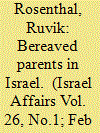

|
|
|
|
|
| Summary/Abstract |
This article explores the changing voice of bereaved parents in Israel from 1948 to the present. Until the early 1980s, bereaved parents did not express their grief or protest publicly. Their bereavement was a strictly private matter. In 1982, shortly after the outbreak of the First Lebanon War, their grief and protest burst into the public sphere. From then on, their voice gained momentum and legitimacy and in time directly impacted the political decision-makers. The article defines four phases in the changing content, tone and style of parental bereavement – hidden, political, privatized, and moral – by analyzing and comparing six representative texts.
|
|
|
|
|
|
|
|
|
|
|
|
|
|
|
|
| 2 |
ID:
182824
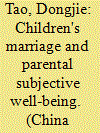

|
|
|
|
|
| Summary/Abstract |
The marriage of children is a milestone event in parenthood, while how parents' well-being evolves around the time children get married is limitedly understood. This paper examines the relationship between children's marriage and parents' subjective well-being. Using China Family Panel Studies (CFPS) data, we find that parental subjective well-being is positively associated with children's marriage. An examination of the underlying mechanisms shows that, first, children's marriage can significantly enhance parents' sense of security in old-age care and their confidence in the future. Second, the older the unmarried children are, the more anxious the parents who hold stronger traditional ideology will be. Third, parents will increase their consumption expenditure after their children get married; and compared with daughters, sons' marriages have a stronger effect on parental well-being. These findings reveal that parental economic pressure due to China's biased sex ratio and marriage squeeze is relieved after their children's marriage.
|
|
|
|
|
|
|
|
|
|
|
|
|
|
|
|
| 3 |
ID:
129802
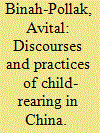

|
|
|
|
|
| Publication |
2014.
|
| Summary/Abstract |
Based on 13 months of fieldwork which was conducted among middle-class families in Beijing, this article explores young children's daily bodily practices and juxtaposes these practices with discourses on child-rearing which have gained prominence in post-Mao China. The article aims to demonstrate that the new discourse on childhood, education, and child-rearing, which has been promoted by the Chinese government since the 1980s, does not always correspond to, and sometimes even contradicts, actual practices in Chinese families. The argument here is that this gap stems in large part from the dominant role of grandparents during the early stages of child-rearing, who tend to perpetuate values and practices, such as obedience and dependence, and to maintain a firm grip on the child's body.
|
|
|
|
|
|
|
|
|
|
|
|
|
|
|
|
| 4 |
ID:
127146
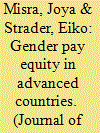

|
|
|
| 5 |
ID:
182892
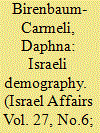

|
|
|
|
|
| Summary/Abstract |
With a fertility rate twice higher than the OECD average, Israel is a world outlier in terms of fertility. This article puts together a composite portrait of this exceptional reproductive landscape. Within a comparative framework, it offers context-specific illustrations showing that considered vis-à-vis women in the Former Soviet Union (FSU) and Jewish FSU immigrants to the U.S., FSU immigrants to Israel had higher fertility. Inside Israel, all non-Jewish women have decreased their fertility rate in the past two decades, whereas Jewish women of all strata, but ultra orthodox women, have increased their fertility rate. Given the material challenges of child-rearing in Israel, the article concludes with some questions and preliminary answers regarding Israel’s exceptional fertility rates.
|
|
|
|
|
|
|
|
|
|
|
|
|
|
|
|
|
|
|
|
|